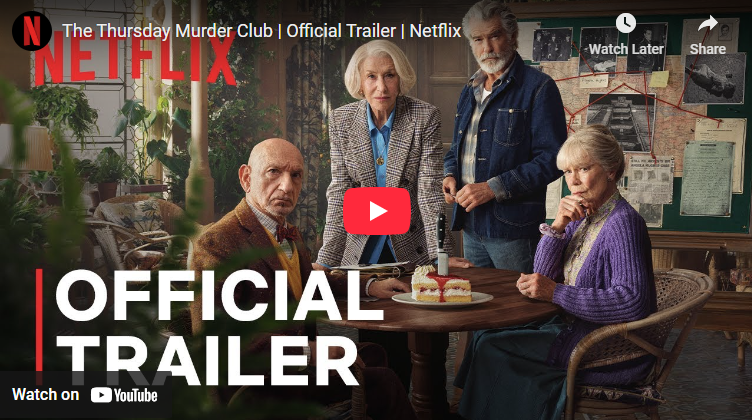
Understanding the Impact of the Netflix Adaptation of The Thursday Murder Club
The popularity of the Thursday Murder Club series by Richard Osman has not only captivated readers through its charming depictions of retirement life in Kent but has also recently transitioned into a Netflix adaptation, sparking discussions about how crime fiction is translated onto screen. This adaptation aims to bring Osman’s witty and cozy crime stories to a broader audience, but it also raises questions about the tensions between maintaining narrative authenticity and appealing to mass viewers.
For fans of crime fiction and newcomers alike, it’s essential to understand the cultural and cinematic shifts involved when a beloved literary work is adapted for television. This article explores these dynamics, evaluates the reception of the Netflix version, and provides guidance for those interested in crime fiction’s role in contemporary media.
Adapting Crime Fiction: Challenges and Opportunities
Adapting a crime novel series like The Thursday Murder Club involves balancing fidelity to the original story with the demands of visual storytelling. The series features a group of elderly detectives solving murders, with a tone that is both humorous and respectful of darker themes such as gangland violence and mental health struggles. When it comes to a screen adaptation, producers often aim to amplify engaging elements while softening or sanitizing content that might be considered provocative or controversial.
In the Netflix version, a notable change has been the emphasis on the series’ lighter aspects, especially the recurring motif of cakes like lemon drizzle and Viennese whirls. While these serve to soften the narrative’s darker moments, they also risk overshadowing the nuanced commentary on aging, crime, and society that Osman’s novels originally portrayed. This raises an interesting question: does sanitizing crime fiction for television dilute its critique or is it necessary to reach a wider audience?
The Role of Humor and Comfort in Crime Narratives
The popularity of The Thursday Murder Club can be partly attributed to its humorous tone and comforting descriptions of cake and community. Orwell’s idea of reading about murder after a satisfying meal is echoed in the books’ cozy atmosphere. The Netflix adaptation has taken this a step further by emphasizing these elements, making the series more palatable for viewers seeking entertainment without distress.
While this approach attracts a broad audience, critics argue it might also diminish the series’ appeal to those who appreciate the darker, more realistic aspects of crime stories. Nevertheless, the focus on humor and domestic settings is a strategic move to make crime fiction more accessible and less intimidating for viewers unfamiliar with the genre.
Representation of Serious Themes in a Sanitized Format
The novels include references to gangland executions and tragic suicides, which add layers of complexity. However, in the Netflix adaptation, these themes are often alluded to rather than explicitly depicted, aligning with the trend of sanitization. This approach helps avoid alienating viewers but can also lead to criticisms that the adaptation lacks depth or omits vital social commentary.
For audiences interested in exploring crime fiction on deeper levels, it’s important to recognize the balance between entertainment and realism. While sanitized content may serve mass appeal, reading the original novels or seeking documentaries on crime issues can provide a more comprehensive perspective.
Audience Reception and Cultural Significance
The enduring success of Osman’s books shows a cultural appetite for crime stories that are gentle yet engaging. The Netflix adaptation has expanded this popularity, although some purists may feel that it simplifies or glosses over nuanced themes. Nevertheless, it reflects a broader trend in entertainment: making complex issues digestible through humor and familiarity.
Furthermore, the series underscores the importance of representation, demonstrating that crime stories need not be violent or gritty to be compelling. Older characters solving mysteries challenge stereotypes about aging and crime, fostering inclusivity in media portrayals.
Implications for Crime Fiction and Media Production
The Netflix adaptation of The Thursday Murder Club exemplifies how media can shape perceptions of crime fiction. Producers aim to create content that balances entertainment with social relevance, sometimes opting for a sanitized version to avoid controversy and increase viewer numbers.
For writers and creatives in the crime genre, this trend highlights the importance of considering audience sensibilities and the potential for storytelling to evolve across different media. It also emphasizes the need for authentic storytelling that respects the intelligence and diversity of viewers.
Conclusion: Navigating Crime Fiction in the Age of Streaming
The adaptation of Richard Osman’s The Thursday Murder Club illustrates the changing landscape of crime fiction in contemporary media. While sanitized versions may differ from the gritty realism of original novels, they serve an important role in broadening access and sparking interest in the genre.
Those interested in crime stories should consider exploring the books themselves to appreciate the full depth and social commentary that Osman’s novels offer. Meanwhile, Netflix’s adaptation provides a comforting, humorous take suitable for a wide audience, teaching us that even the darkest stories can be told with a light touch.
If you’re keen to learn more about crime fiction’s evolving role in media or are considering studying media, literature, or cultural studies, explore programs at Loughborough University. They offer insights into storytelling, media production, and societal narratives that shape our understanding of crime and justice.

